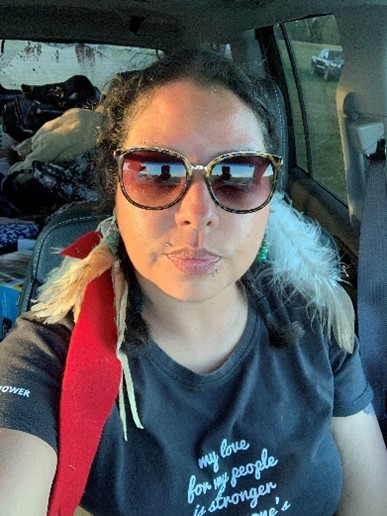National Prevent Child Abuse month and ICWA
 Shana King, Parent Mentor, ICWA Law Center on Prevent Child Abuse Month |
Hello, My name is Holy Owl Woman but I go by Shana, my English given name. I am a citizen of the Fort Berthold, a mother of five beautiful human beings and a grandmother of three and the fourth will be born this month and his name will be Easton. I have worked at the Indian Child Welfare Act Law Center for ten years where I draw on my “lived experience” to help families. I aged out of foster care and then as an adult had two of my children enter the foster care system and somehow I successfully reunified with them. |
April is National Prevent Child Abuse month. What does prevention look like in your ICWA work?
Reunification is always the goal in every case, but in reality not every child who is removed is later returned to their home. That is why, in my work, the first goal is always to resolve potential child protection issues before a child is removed and a case opens. So many children do not need to be in the system because the underlying issues are best handled with support from family and the community. The ICWA Law Center has a wonderful advocacy team which includes an Indian Advocate and a Parent Mentor available for families who reach to the Law Center for help when they are first contacted by CPS. We have been asked by hospitals and social workers to assist families prior to opening a case. We have a wonderful indigenous community here in the Twin Cities and we make cultural connections that can assist families with their needs to keep their children in the home.
How has culture been a protective factor in your work or in your life when it comes to safe families?
Because cultural connections are so important, I am a true believer that in order for my people to heal we must come back to our traditions and ways of our individual tribes. We must begin healing by learning our languages and participating in ceremonies. In Hennepin County we are allowed to smudge in the court room. At the Law Center, we are asked to come to the courthouse and smudge if a family requests in a reunification hearing. I carry cedar, sage and tobacco everywhere I go and I am so happy that the families I work with request to smudge and lay down tobacco in prayer.
Cultural teachings and wisdom are important at every phase of the child protection process. I always advocate for native treatment centers or native community agencies where traditional knowledge is passed along and integrated into the treatment. This matters whether it’s parenting, therapy, treatment or even a doctor appointment. As I write this section, I took a break for our weekly ICWA cabinet meeting, held this week in person at our office. For cabinet, we welcome all the stakeholders involved in an ICWA Case including judges and tribes. The session was opened with a tobacco ceremony led by our elder in residence where we were able to smudge and pray for ourselves since we mainly are focused on the families we work with. Cultural teachings are embedded into the work we do every day because this practice is good for us and good for our families.
We know that child abuse is a vestige of the trauma of forced assimilation by the settler colonialism. What do people that are not familiar with this history or non-Indigenous people need to learn about preventing child abuse in Indian country?
It is critically important for anyone working with Native families to understand our unique history, including the many measures to eliminate our culture for most of the history of the United States. Knowledge of the history of indigenous people should be a requirement for anyone working with Native families. Without the understanding of the history of generational and historical trauma one will never understand why so many of us are dealing with chemical health issues, diabetes, and mental health issues. How these very issues are passed on to generation to generation until someone steps up and breaks the generational curses. In order to understand my people you must first know our history. I consider the child protection system a continuation of boarding schools and the adoption era where indigenous families get stuck in a colonized system that rips their families apart. The current and ongoing massive rush to terminate parental rights in Native families should not happen. The time lines imposed by this colonized system are unreasonable, especially because Native families need to heal from generations of continued forced assimilation and historical and generational trauma. It is also important to acknowledge that the case plans in a child protection case are very colonized and don’t even represent our family structure. In my tribe we recognize our cousins as our brother and sisters. Those bonds are like a sibling relationship and they are very close. My aunties and uncles would be my children’s grandma and grandpas and that role is very important especially when it comes time for ceremonies. It is something to consider when we remove children and put them into out of home placement, visitation and a bigger circle of support for the family.
Lastly but not least we must want healing along with reunification for indigenous families and keep that at the forefront of our work in order to overcome many years of then being torn apart. Without healing reunification may not be successful and ultimately that should be the goal. Every Indigenous family deserves a chance to overcome whatever barriers that brought them into the system and to thrive together.